
- This event has passed.
Reducing Australia’s Transport Emissions, Sydney 15th September 2022
Exploring evidence based solutions to reduce Australia's fastest growing source of emissions
September 15, 2022 @ 9:00 am - 5:00 pm
$295.00 – $450.00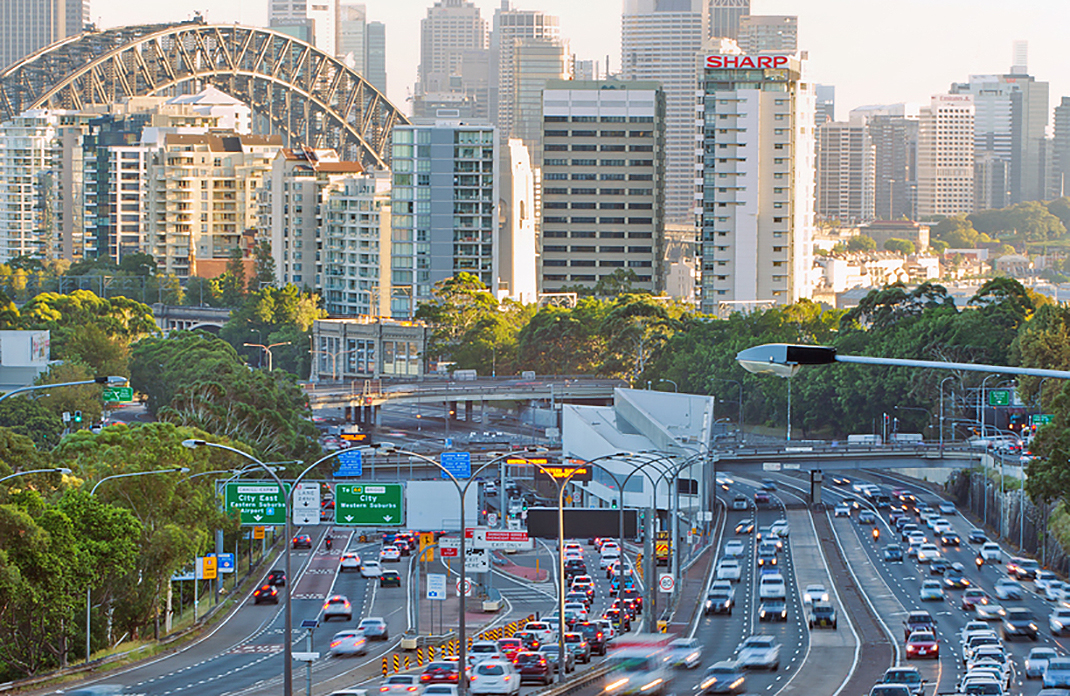
Reducing Australia's Transport Emissions, Sydney 15th September 2022
Exploring evidence based solutions to reduce Australia's fastest growing source of emissionsGeneral Information
Transport is Australia’s fastest growing source of emissions
This one day seminar brings together some of Australia’s leading thinkers and policy makers to highlight practical, evidence-based solutions to reducing Australia’s transport emissions. The focus is to provide you with pragmatic strategies for lowering transport emissions.
Why is this seminar important?
Transport emissions have grown more than any other sector, increasing nearly 60% since 1990.
Australia is now ranked as one of the worst performing OECD countries in transport efficiency, with among the highest levels of car dependence and lowest levels of electric vehicle uptake.
The infographic below illustrates the stark contrast between dirty and clean transport modes and the space each mode consumes. This figure uses black balloons to illustrate the emissions, on a per person, per kilometre basis. The footprints represent the space consumption of different modes of transport.
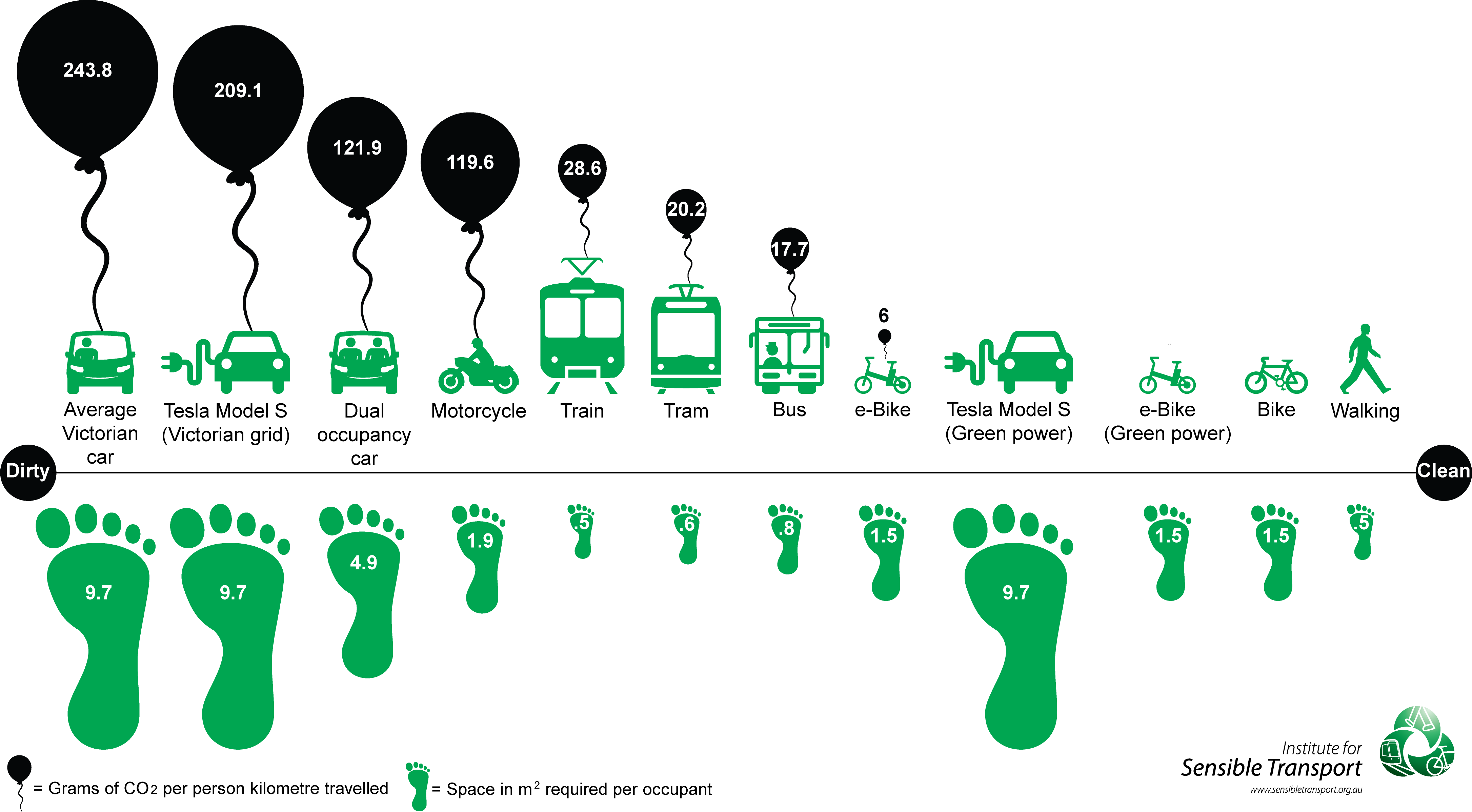
Topics
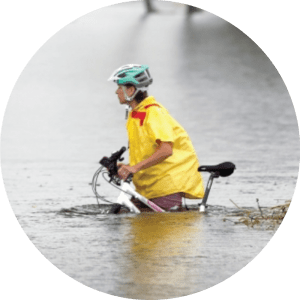
Connecting transport with emissions reduction
Australia’s transport system has historically been planned without sufficient consideration of the emissions impact of how we get around. Leading climate change and transport experts will provide a clear relationship between our mobility and emissions.
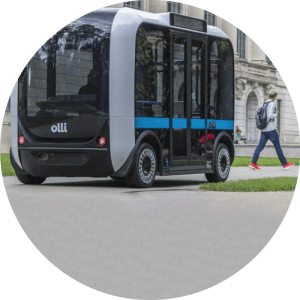
Understanding the political dimension
The decision to build large infrastructure projects often has a political origin, and rarely does this include a careful consideration of the emissions impact of these projects. Those who’ve held public office will provide some insight as to how emissions lowering projects are viewed politically.
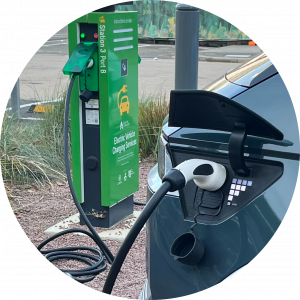
Electric vehicles
Electric vehicles are set to become the dominant form of motoring in coming decades. The role of government in helping to transition the fleet to zero emission vehicles will be described. Principles of EV charging network design and organisational fleet transition will be covered.
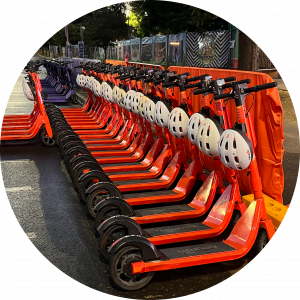
e-Micro mobility
E-scooters, e-bikes and other small, light vehicles are beginning to play an important role in lowering emissions and reducing congestion. Key factors to successfully shifting towards micro-mobility as the first choice for short and medium trips will be covered as well as NSW specific issues

Public transport
Electric public transport is a critical feature of the zero-emission transport system. Public transport experts will outline what is required to create a public transport system that provides a compelling alternative to the car and is run on clean electricity.

Urban planning
Leading urban planners will outline the link between density, the built form and transport outcomes. Participants will be shown how a city’s transport emissions are related to urban planning and what is required to achieve an urban form that lowers emissions.
Speakers
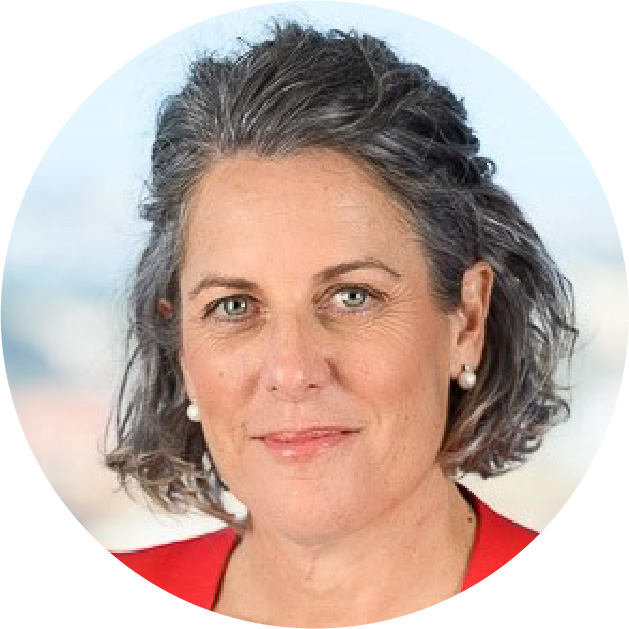
Romilly Madew AO FTSE HonFIEAust
incoming CEO of Engineers Australia, and former CEO of Infrastructure Australia
Romilly Madew AO is the incoming CEO of Engineers Australia, from August 2022. Previously Romilly was CEO of Infrastructure Australia, where she was responsible for overseeing IA’s critical role in helping governments prioritise projects and reforms that best serve our communities. Before joining IA, Ms Madew was CEO of Green Building Council of Australia for 13 years.
Previously Romilly was CEO Infrastructure Australia (IA), where she was responsible for overseeing IA’s critical role in helping governments prioritise projects and reforms that best serve our communities.
Previously Romilly was CEO Infrastructure Australia (IA), where she was responsible for overseeing IA’s critical role in helping governments prioritise projects and reforms that best serve our communities.
Before joining Infrastructure Australia, Ms Madew was CEO of Green Building Council of Australia for 13 years. In acknowledgment of her contribution to Australia’s sustainable building movement, Ms Madew was awarded an Order of Australia in 2019.
Previously Romilly was CEO Infrastructure Australia (IA), where she was responsible for overseeing IA’s critical role in helping governments prioritise projects and reforms that best serve our communities.
Before joining Infrastructure Australia, Ms Madew was CEO of Green Building Council of Australia for 13 years. In acknowledgment of her contribution to Australia’s sustainable building movement, Ms Madew was awarded an Order of Australia in 2019.
Previously Romilly was CEO Infrastructure Australia (IA), where she was responsible for overseeing IA’s critical role in helping governments prioritise projects and reforms that best serve our communities.
Before joining Infrastructure Australia, Ms Madew was CEO of Green Building Council of Australia for 13 years. In acknowledgment of her contribution to Australia’s sustainable building movement, Ms Madew was awarded an Order of Australia in 2019.
She is currently a Member of the Australian Academy of Technology & Engineering (ATSE) Infrastructure Forum; Member of Placemaking NSW Advisory Committee; Director of Sydney Olympic Park Authority; Independent Chair of the Currawong State Park Advisory Board (NSW)[; Federal Government appointee, G20 EMPOWER – Empowerment and Progression of Women’s Economic Representation and Director of Minerva Network (supporting Australia’s elite sportswomen).
Romilly is an active surf life saver. She was previously President of Bilgola SLSC for 6 seasons, is a Patrol Captain for Bilgola, a Duty Officer for Surf Lifesaving Sydney Northern Beaches Branch (SLSSNB) as well as being their Support Services Coordinator and a Committee Member for their Board of Life Saving and Diversity and Inclusion working group.

Dr Jennifer Kent
Urbanism Research Lead, University of Sydney
Dr Jennifer Kent is a Senior Research Fellow and Urbanism Research Lead at the University of Sydney School of Architecture, Design and Planning. Jennifer’s research interests are at the intersections between urban planning, transport and human health. Key issues examined to date include parenting and private car use, companion animals and transport, and the links between health and higher density living. Jennifer focuses on the cultural and structural barriers to sustainable transport use
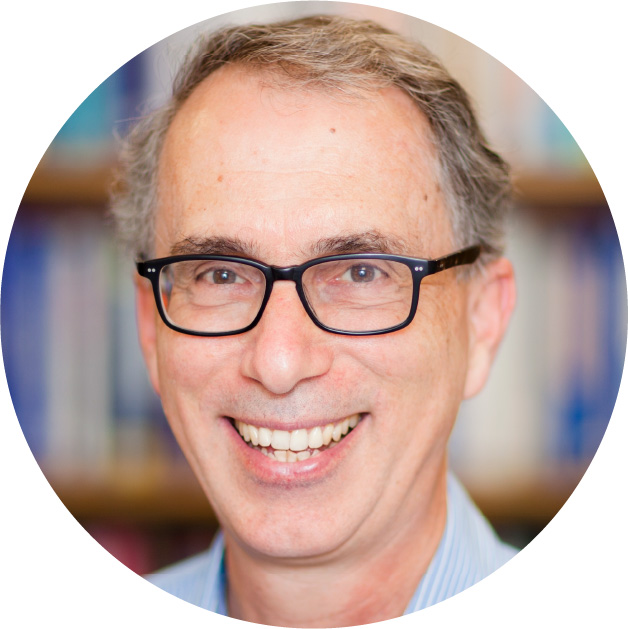
Professor David Karoly
Atmospheric scientist and IPCC author, University of Melbourne (Honorary)
Professor Karoly is established as one of the world’s leading climate scientists and advises government on climate change policy. He is an IPCC author and has published on the political leadership required to tackle climate change. Professor Karoly will provide an important reminder of the significant role the transport profession can play in helping Australia work towards a safe climate.

Dr Elliot Fishman
Director, Transport Innovation, Institute for Sensible Transport
Dr Fishman is ranked by Stanford University in the top 2% of scientists globally. He completed his PhD at the Centre for Accident Research and Road Safety and his Post Doc at Utrecht University in the Netherlands. He has advised the Prime Minister’s Office on sustainable mobility, as well as the OCED, the National Government of Singapore and many Councils and state governments.
In 2005 he founded the Institute for Sensible Transport where he is currently its Director. In this role he has undertaken work for the OECD, the National Government of Singapore, and advised the Australian Prime Minister’s Office on sustainable mobility policy. He has worked with dozens of local government on transport strategy as well as most state governments in Australia, through his role at the Institute.
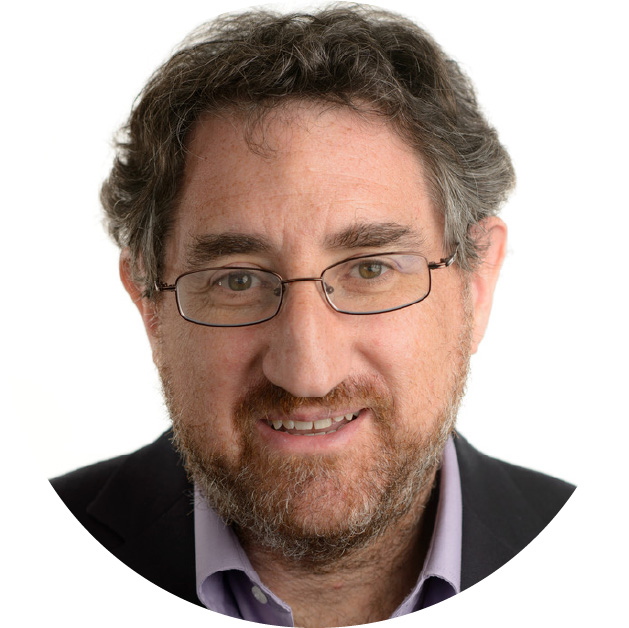
Professor David Levinson
Professor of Transport Engineering, University of Sydney
Professor Levinson is a leading transport expert and author of several books examining travel behaviour, land use and low emissions transport. He has published on the role of land use planning on reducing car use and emissions, public transport planning and enhancing the accessibility of our cities, including Sydney. His presentation will include a focus on how Sydney can significantly lower its transport emissions through land use and policy interventions.

Liam Davies
Senior Transport Analyst, Institute for Sensible Transport
Liam is a technical research specialist, with a focus on applying analytical methods to transport challenges. He has an in-depth understanding of transport emissions modelling, electric vehicle transition pathways for organisational fleets and large scale transport projects to reduce emissions.

Vaughn Allan
Senior Transport Analyst, Institute for Sensible Transport
Vaughn Allan is a senior transport analyst with a special interest in enhancing sustainable mobility outcomes. He has also worked at the Department of Premier and Cabinet, advising on large scale transport projects and will discuss the role of local and state government in active transport projects.
He has played a central role in the development of precinct-based transport plans (e.g. Wonthaggi Access and Movement Study, City of Casey Hampton Park Central Access and Movement Study). He is also a key member of the team that developed the Yarra Ranges Integrated Transport Strategy. He has an intimate knowledge of the Victorian Planning Scheme as it pertains to transport and parking issues. He is also familiar with the Transport Integration Act and will ensure our recommendations for the Access and Movement Study are compliant with this Act.
Venue
Customs House
Circular Quay, Sydney
9.00am – 5.00pm
Thursday 15th September 2022
Why is this seminar different?
- Each speaker has been carefully selected for their depth of knowledge in climate change, sustainable mobility, and urban planning, their engaging speaking capabilities and ability to tie this knowledge into the Australian context.
- Solutions orientated: This seminar is solutions focused and will provide practical lessons on how to achieve a zero emissions transport system in the Australian context.
- Mode agnostic: The topics cover all modes of transport without having a ‘favourite. Electric vehicles, public transport, walking and cycling, as well as e-micro mobility all have a place in a zero emissions transport future. Ultimately its about picking the right tool for the job.
- Great balance of audience interaction. Many conferences leave little time for Q&As. This conference offers generous opportunities for the audience to contribute and ask questions.
